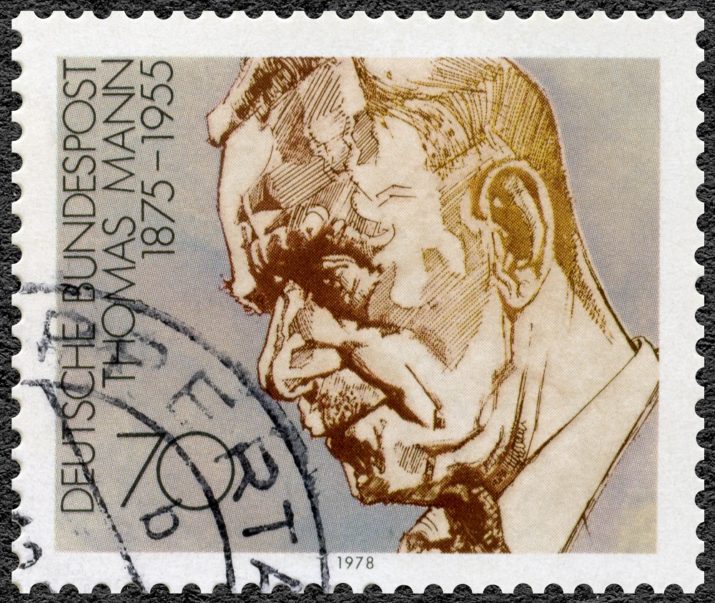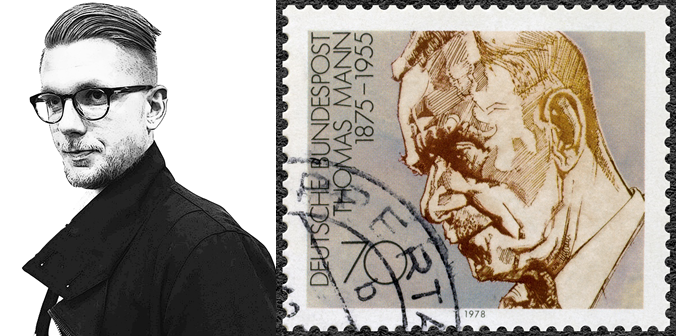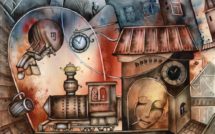

This essay is part of Morten Høi Jensen’s column European Diarist.
In the spring of 1938, Thomas Mann traveled across America delivering a lecture titled “The Coming Victory of Democracy,” published in book form that same year by Alfred Knopf in New York. (The book became the subject of one of First Lady Eleanor Roosevelt’s syndicated newspaper columns). For a time, it was perhaps the best known of Mann’s books in America, outselling even his (back then) quite popular novels. The lecture tour, meanwhile, drew thousands of listeners in some twenty-odd cities across the country, and was reviewed favorably in Life magazine, which called Mann “the most distinguished anti-Fascist writer in the world today.”
“The Coming Victory of Democracy” was designed to alert Americans to the imminent threat posed by Hitler’s Third Reich, and by fascism more generally. As he would later do in his German radiobroadcasts for the BBC, Mann spoke in no uncertain terms about the crimes being committed against European Jewry by the Nazis. (His brother, Heinrich, had guessed as early as 1936 that the Nürnberg Laws would eventually lead to the decision to exterminate the Jewish population). But the lecture was also a pedagogical reminder of America’s own contribution to the development of modern democracy; Mann cleverly wrapped his plea for America to reject isolationism in charm and flattery. No one in the audience, he said, needed instruction in democracy — “least of all from a European.” What he wanted instead was to reawaken democracy as a “spiritual and moral possession of which it would be dangerous to feel too secure and too confident.” He specifically addressed himself to the country’s youth, concerned that here, as in Germany, young people would be attracted to the novelty of fascism and its endless publicity tricks — its beer hall antics and teeming rallies. “The advantage, or the apparent advantage,” he wrote, “of the tendencies that are hostile to democracy is, above all, the charm of novelty — a charm to which humanity always shows itself highly susceptible.”
Next to fascism’s fresh-faced vitality and fantasies of national grandeur, stable, plodding democracy was easy to ridicule as decayed and out of date. Weimar-era democracy, in particular, made for an easy target, but for the shortsighted, democracy is always easy to caricature. As Tocqueville wrote in 1835: “[Democracy’s] faults strike one at first approach, but its qualities are only discovered at length.”
Wary of the youthful temptations of novelty, Mann argued eloquently for a political-spiritual renaissance, a rekindling of faith in the long project of democracy. He reminded his audience that it was “your American statesmen and poets such as Lincoln and Whitman who proclaimed to the world democratic thought and feeling, and the democratic way of life, in imperishable words.” Whitman in particular, Mann thought, knew better than any other writer or thinker how to elevate a political idea into “intoxicating song.”
But Mann was also conscious of the dangers of lapsing into what he called “after-dinner oratory,” of enshrining democracy in vague and grandiloquent terms. He knew all that could be said against democracy, having spent much of the 1910s as a staunchly conservative believer in German national strength, mocking intellectuals (like his brother) who had remained pacifist during the First World War, and who had committed themselves to liberal and progressive ideals. “I must regretfully own,” he told his audiences, “that in my younger years I shared that dangerous German habit of thought which regards life and intellect, art and politics as totally separate worlds. In those days we were all of us inclined to view political and social matters as non-essentials that might well be entrusted to politicians.”
Democracy, Mann now believed, was too important to be left only to politicians: “Every definition of democracy is insufficient – insufficient for belief in it – if it is confined to the technical-political aspects.” It must not be taken for granted, as it had been in Europe. Like Stefan Zweig and many other refugees and émigré writers, he hoped that its coming victory, as he put it, would be possible in America instead. “It is my intention to make my home in your country,” Mann told his audiences, “and I am convinced that if Europe continues for a while to pursue the same course as in the last two decades, many good Europeans will meet again on American soil.” He continued:
I believe, in fact, that for the duration of the present European dark age, the centre of Western culture will shift to America. America has received much from Europe, and that debt will be amply paid if, by saving our traditional values from the present gloom, she can preserve them for a brighter future that will once again find Europe and America united in the great tasks of humanity.
Mann settled permanently in America in October 1938, living first in Princeton before later moving to California, where he used his eminence and status to help fellow exiles and refugees navigate the morass of bureaucratic visa restrictions. In October 1938, he wrote a letter to Secretary of State Cordel Hull asking him to intervene in the case of several German refugees associated with the Thomas Mann Gesellschaft in Prague, a fund created to aid exiled intellectuals and allow them to continue their work outside of Germany. The individuals in question included the pianist Leo Kestenberg, the journalist Joachim Werner, the writers Wilhelm Necker and Alexander Bessmertny, and the actress Fritta Brod, among others. “Would it be possible for higher authorities to give the consulate in Prague power to facilitate entry to America for these imperiled and extremely worthy persons?” Thomas Mann asked in his letter. His petition was denied. Miraculously, all but one of them survived the war. The lone exception was Alexander Bessmertny, who was arrested by the Gestapo in Prague a few months later and executed in Berlin the following year.
Mann quickly grew disillusioned with the direction of American democracy after the war. In 1951, his name was included on a list published by the House un-American Activities Committee, which regularly harassed his more radical children, Klaus and Erika. They’d also been under FBI surveillance for years. Mann and his family left for good in 1952, ending their days in neutral Switzerland. (As early as 1938 “The Coming Victory of Democracy” was considered by one FBI agent “extremely Communist.”) When Mann was later invited by the New York Times to comment on the rise of McCarthyism and the “realities and danger in the current trend of American foreign policy toward restriction of entry,” he responded, “No thank you.”
Morten Høi Jensen was born in Copenhagen, Denmark. He has contributed to the Los Angeles Review of Books, Salon, and The New Republic, and is the author of a forthcoming biography, A Difficult Death: The Life and Work of Jens Peter Jacobsen, due out from Yale University Press in the fall of 2017.
Photo: Morten Høi Jensen, Private
Photo: A stamp printed in Germany shows Paul Thomas Mann, Olga Popova | Shutterstock
Published on April 4, 2017.




